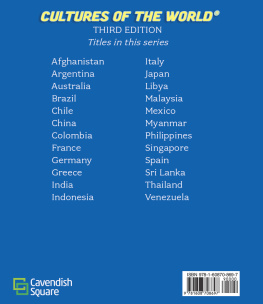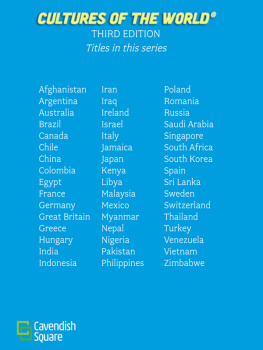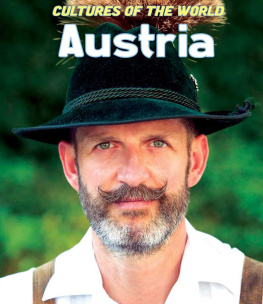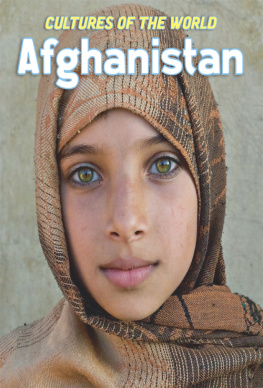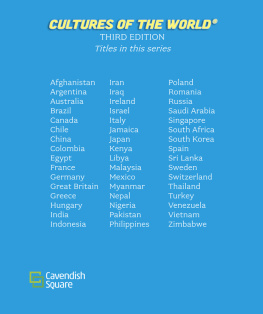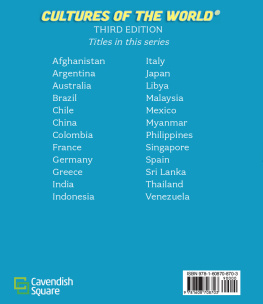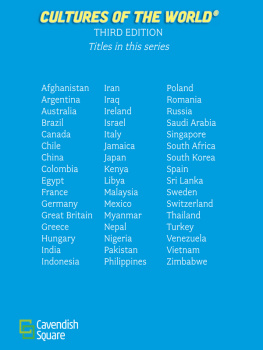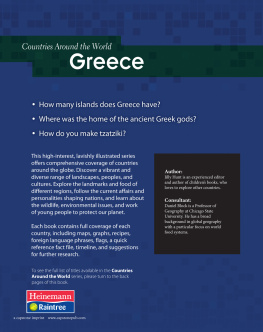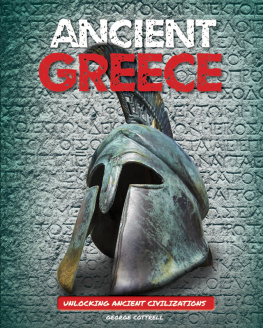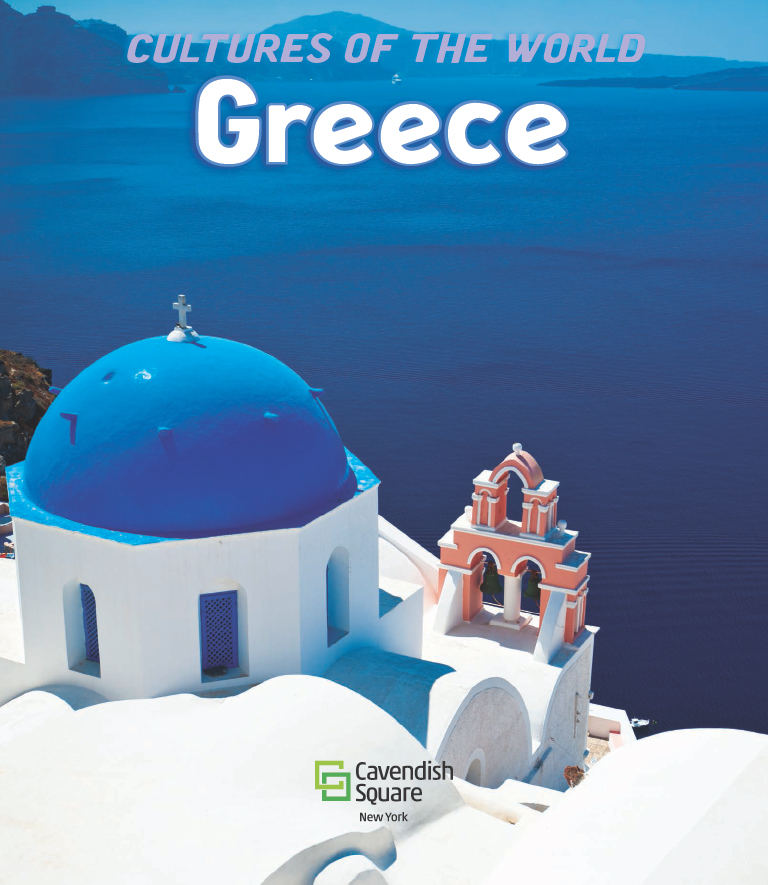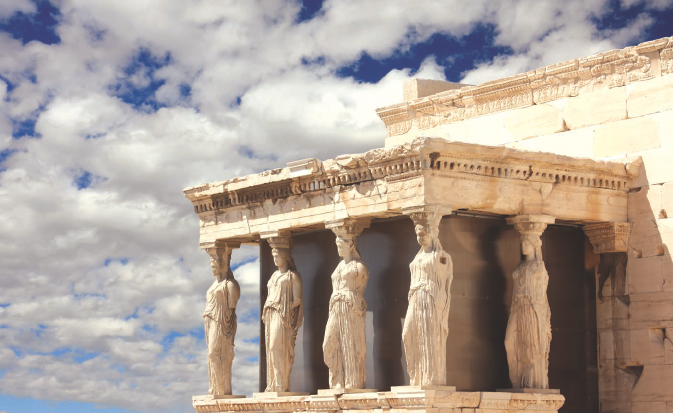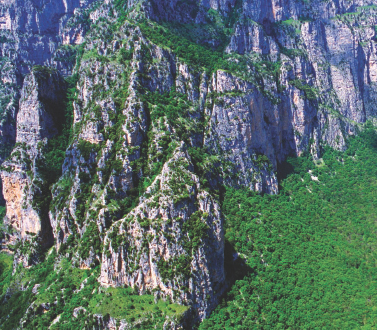Published in 2014 by Cavendish Square Publishing, LLC
303 Park Avenue South, Suite 1247, New York, NY 10010
Third Edition
This publication is published with arrangement with Marshall Cavendish International (Asia) Pte Ltd.
Copyright 2014 Marshall Cavendish International (Asia) Pte Ltd.
All rights reserved. No part of this publication may be reproduced or transmitted in any form or by any means, or stored in any retrieval system of any nature without the prior written permission of Marshall Cavendish International (Asia) Pte Ltd.
Website: cavendishsq.com
Cultures of the World is a registered trademark of Times Publishing Limited.
This publication represents the opinions and views of the author based on his or her personal experience, knowledge, and research. The information in this book serves as a general guide only. The author and publisher have used their best efforts in preparing this book and disclaim liability rising directly or indirectly from the use and application of this book.
CPSIA Compliance Information: Batch #WS13CSQ
All websites were available and accurate when this book was sent to press.
Library of Congress Cataloging-in-Publication Data
Greece / Jill Dubois ... [et al.]. 3rd ed.
p. cm. (Cultures of the world)
Includes bibliographical references and index.
ISBN 978-1-60870-869-7 (hardcover) ISBN 978-1-62712-160-6 (paperback) ISBN 978-1-60870-875-8 (ebook)
1. GreeceJuvenile literature. I. DuBois, Jill, 1952
DF717.G779 2014
949.5dc23 2012018496
Writers: Jill Dubois, Xenia Skoura, Olga Gratsaniti, and Yong Jui Lin
Editors: Deborah Grahame-Smith, Mindy Pang
Copyreader: Tara Tomczyk
Designers: Nancy Sabato, Adithi
Cover picture researcher: Tracey Engel
Picture researcher: Joshua Ang
PICTURE CREDITS
Cover: Vidler / age footstock
Banknotes.com 135 Getty Images 103 Inmagine.com 1, 3, 5, 6, 9, 10, 12, 15, 16, 18, 20, 21, 22, 23, 24, 26, 27, 28, 29, 30, 32, 34, 35, 37, 38, 40, 43, 44, 45, 46, 48, 50, 51, 52, 53, 54, 55, 56, 59, 61, 62, 64, 66, 68, 69, 70, 71, 72, 73, 74, 76, 77, 78, 79, 80, 81, 82, 84, 85, 87, 89, 91, 92, 94, 95, 97, 98, 99, 100, 101, 102, 104, 105, 106, 107, 108, 109, 110, 111, 112, 113, 114, 115, 116, 117, 118, 119, 120, 121, 122, 123, 124, 125, 126, 127, 128, 129, 130, 131
PRECEDING PAGE
A church with the bell tower stands by a coast in Santorini, part of the Cyclades islands.
Printed in the United States of America
CONTENTS
GREECE TODAY
1. GEOGRAPHY Land of mountains Rivers and lakes Flora and fauna Cities Climate
2. HISTORY Early civilizations The city-states The Golden Age of Athens Macedonia Roman and Byzantine empires Frankish and Venetian occupation Turkish rule Independence Birth of modern Greece Dictatorship and war Democracy
3. GOVERNMENT Administrative structure Parliament and the monarchy Dictatorship and democracy Armed forces Political parties
4. ECONOMY Roots of crisis EU membership: blessing or curse? Reaction to bailout and austerity measures Unemployment in Greece Tourism Agriculture Fishing A leader in shipping Industry Mining
5. ENVIRONMENT Endangered species Air pollution Waste disposal and recycling Conservation efforts
6. GREEKS Greek personality Population trends Minority groups Social divisions Folk dress
7. LIFESTYLE The family Special relationships Greek women Philotimo Education School elections Friends Love is in the air Tying the knot Children Death rituals
8. RELIGION Christian beginnings Church authorities Religious practices Wearing the robes Monastic life
9. LANGUAGE Origins The alphabet The media Dialects
10. ARTS Early Greek literature The Golden Age Hellenistic and Byzantine literature Art and architecture in ancient Greece Geometric art and architecture Archaic art and architecture Classical art and architecture Hellenistic and Byzantine art Modern literature Modern music Modern art
11. LEISURE Folk music Folk dancing Sports Movies and television Theater
12. FESTIVALS Festivals of patron saints Christmas Saint Basils Day Epiphany Name days Independence Day and Ochi Day Easter season
13. FOOD Traditional food and drink The open-air market of Athens Popular Greek dishes Mealtimes Table manners and social graces Yiassas
MAP OF GREECE
ABOUT THE ECONOMY
ABOUT THE CULTURE
TIMELINE
GLOSSARY
FOR FURTHER INFORMATION
BIBLIOGRAPHY
INDEX
GRECE TODAY
T HE STATE OF MODERN GREECE HAS EXISTED FOR 52 YEARS fewer than the United States; it was founded in 1828, following the Greek War of Independence, when the Great Powers (the United Kingdom, France, and Russia) had given the recognition of its autonomy from the ruling Ottoman Empire.
Modern Greece traces its roots to the civilization of ancient Greece, generally considered the cradle of Western civilization. As such, Greek civilization is the birthplace of democracy, Western philosophy, the Olympic Games, Western literature, political science, major scientific and mathematical principles, and Western drama, including both tragedy and comedy. This legacy is partly reflected in the 17 United Nations Educational, Scientific and Cultural Organization (UNESCO) World Heritage Sites located in Greece, ranking Greece seventh in Europe and 13th in the world in terms of the number of UNESCO sites.
At its geographical peak, Greek civilization spread from Greece to Egypt and to the Hindu Kush Mountains in Afghanistan. Since then, Greek minorities have remained in former Greek territories, and Greek emigrants have assimilated into societies across the globe.
The Vikos Gorge lies in the North Pindus Mountains in the region of Epirus, 24 miles (39 km) from the Albanian border. This 7-mile (11 km) gorge is part of the Aoos-Vikos National Park and is popular with hikers.
The traditional date for the end of the ancient Greek period is the death of Alexander the Great in 323 b.c. The period that follows is classified as Hellenistic. Hellenistic civilization has been immensely influential on the language, politics, educational systems, philosophy, art, and architecture of the modern world, particularly during the Renaissance in Western Europe and again during various neoclassical revivals in 18th- and 19thcentury Europe and the Americas.
Romans conquered ancient Greece in 168 b.c., but Greek culture conquered Roman life. With the Christianization of Greece following the Byzantine Empires formation in a.d. 395, the Greek peninsula became one of the strongest centers of Christianity. In 1453, after an invasion, Greece became part of the Ottoman Empire.
Greece consists of a mountainous, peninsular mainland jutting out into the sea at the southern end of the Balkans, ending at the Peloponnese Peninsula (separated from the mainland by the canal of the Isthmus of Corinth). Greece also has 1,200 islands, of which 227 are inhabited. Crete is the largest and most populous island; Euboea, separated from the mainland by the 197-feet-wide (60-meter-wide) Euripus Strait, is the second largest, followed by Rhodes and Lesbos.
Eighty percent of Greece consists of mountains or hills, making the country one of the most mountainous in Europe. Mount Olympus, the mythical abode of the Greek gods, is the highest in the country. The Pindus mountain range is characterized by its high, steep peaks, often dissected by numerous canyons. The spectacular Vikos Gorge, part of the Vikos-Aoos National Park in the Pindus Mountains, is listed by Guinness World Records as the deepest gorge in the world. Other notable formations are the Meteora rock pillars, atop which were built medieval Greek Orthodox monasteries. Rare marine species such as the pinniped seal and the loggerhead sea turtle live in the seas surrounding mainland Greece, while its dense forests are home to the endangered brown bear, the lynx, the roe deer, and the wild goat.

